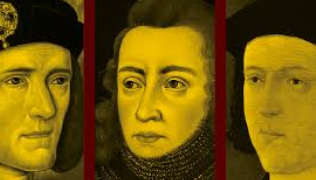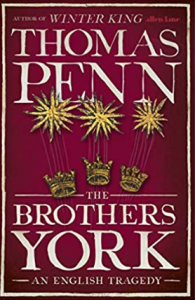
Ferocious life of three York brothers


Edward IV who “upside-downed his brother and drowned him, dead in a butt of malmsey “was youthful war hero turned seedy sun-king, having seized the throne in 1461 just shy of his 19th birthday, and presided over a court that tottered bibulously on the line between chivalric self-glorification and flat-out debauchery.
Edward was needled by his tetchy brother George, Duke of Clarence, whose secretive execution for treason in 1478 gave rise to the story that he had been drowned in a butt of his favourite sweet white wine. Meanwhile another brother was quietly amassing his own power, Richard, Duke of York.
Thomas Penn’s new book takes as its titular subject the lives of these three brothers the Yorks’ cousins through their mother Cecily Neville, Richard Neville, Earl of Warwick, is known to history as the “kingmaker” and Edward’s most powerful political minister, we also meet George Neville, the cultured and canny Archbishop of York, and his doughty warrior brother John, whose hold over the north of England played an critical role in securing Edward’s early reign.
The Nevilles and the Yorks had experienced pain and loss together. Each trio of brothers had originally been a set of four. The York boy’s father, Richard, Duke of York, and the Nevilles’ father Richard, Earl of Salisbury, had died fighting together at the battle of Wakefield, each alongside their second son. After decisive battle of Towton, the victorious Yorkists hacked off the noses and ears of enemy corpses, to prevent their identification at the resurrection. In defiance of Christian code, they were buried west. “When they awoke and sat up on the day of resurrection, their scarred, sightless eyes would be looking away from the sun and the risen Christ”.
By 1461, the Yorks and Nevilles had seized power from the advisers around their cousin Henry VI, who suffered from severe mental illness and may have been incapable of fathering the son with whom his wife had presented him a few years earlier.
Penn reveals how Edward IV enjoying his new status and his sexual exploitation of impoverished young widows forced to petition the new king for enforcement of their inheritance claims. This is world of young men whose insistence on seeing themselves as a new Camelot was an essential veneer to the brutality waiting to burst out any moment. Penn reveals Edward’s greatest act of political self-sabotage – his decision to marry, secretly and on impulse, the unsuitable Elizabeth of Woodville. His misjudgement would eventually push both Clarence and Warwick blindsided while negotiating a French marriage – into open rebellion.
Penn dismisses the blacker calumnies perpetrated against Richard III by his Tudor successors, while being clear-eyed about Richard’s power-grab, which led to deaths of Edward IV’s two young sons. Thus Richard like Clarence before him, demolished his own family’s posterity.
The Brothers York: An English Tragedy by Thomas Penn, Allen Lane £30, 688 pages.
